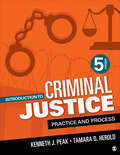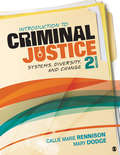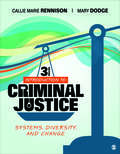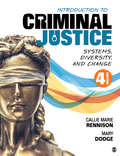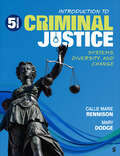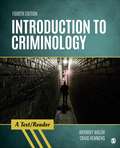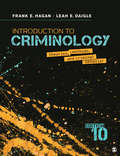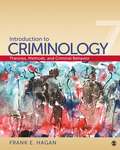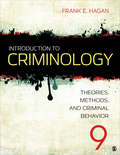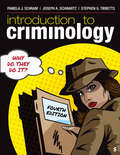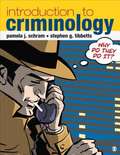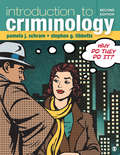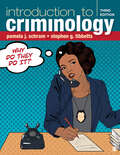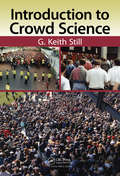- Table View
- List View
Introduction to Criminal Justice: Practice and Process
by Kenneth J. Peak Tamara D. HeroldA practical and applied introduction to Criminal Justice Introduction to Criminal Justice: Practice and Process shows students how to think practically about the criminal justice system by offering them a proven, problem-based approach to learning. Bestselling authors Kenneth J. Peak and Tamara D. Herold draw on their many years of combined practitioner and academic experience to explain the importance of criminal justice and show how key trends, emerging issues, historical background, and practical lessons can be applied in the field. The new Fifth Edition includes learn-by-doing activities at the end of each chapter, review questions, case studies, and a list of key terms, allowing students to enhance their critical analysis and problem-solving skills.
Introduction to Criminal Justice: Practice and Process
by Kenneth J. Peak Tamara D. HeroldA practical and applied introduction to Criminal Justice Introduction to Criminal Justice: Practice and Process shows students how to think practically about the criminal justice system by offering them a proven, problem-based approach to learning. Bestselling authors Kenneth J. Peak and Tamara D. Herold draw on their many years of combined practitioner and academic experience to explain the importance of criminal justice and show how key trends, emerging issues, historical background, and practical lessons can be applied in the field. The new Fifth Edition includes learn-by-doing activities at the end of each chapter, review questions, case studies, and a list of key terms, allowing students to enhance their critical analysis and problem-solving skills.
Introduction to Criminal Justice: Systems, Diversity, and Change
by Callie Marie Rennison Mary J. DodgeIntroduction to Criminal Justice: Systems, Diversity, and Change, Second Edition, offers students a brief, yet comprehensive, introduction to Criminal Justice with up-to-date coverage of all aspects of the criminal justice system in succinct and engaging chapters. Authors Callie Marie Rennison and Mary Dodge weave four true criminal case studies throughout the book, capturing students’ attention with memorable stories that illustrate the real-life pathways and outcomes of criminal behavior and victimization. Designed to show the connectedness of the criminal justice system, each case study brings the chapter concepts to life. To further captivate and inform students, important and timely topics such as ethics, policy, gender, diversity, victimization, and white-collar crime are discussed throughout.
Introduction to Criminal Justice: Systems, Diversity, and Change
by Callie Marie Rennison Mary J. DodgeIntroduction to Criminal Justice: Systems, Diversity, and Change, Second Edition, offers students a brief, yet comprehensive, introduction to Criminal Justice with up-to-date coverage of all aspects of the criminal justice system in succinct and engaging chapters. Authors Callie Marie Rennison and Mary Dodge weave four true criminal case studies throughout the book, capturing students’ attention with memorable stories that illustrate the real-life pathways and outcomes of criminal behavior and victimization. Designed to show the connectedness of the criminal justice system, each case study brings the chapter concepts to life. To further captivate and inform students, important and timely topics such as ethics, policy, gender, diversity, victimization, and white-collar crime are discussed throughout.
Introduction to Criminal Justice: Systems, Diversity, and Change
by Callie Marie Rennison Mary J. DodgeHelping students develop a passion to learn more about the dynamic field of criminal justice, this concise bestseller introduces students to the criminal justice system by following the case studies of four individuals in their real-life progression through the system. Each case study is strategically woven throughout the book to help students remember core concepts and make connections between different branches of the system. In addition to illustrating the real-life pathways and outcomes of criminal behavior and victimization, authors Callie Marie Rennison and Mary Dodge provide students with a more inclusive overview of criminal justice by offering insight into overlooked demographics and the perspectives of victims. This newly revised Third Edition encourages students to think critically and discuss issues affecting today’s criminal justice system with engaging coverage of victims, criminal justice professionals, offenders, and controversial issues found in the criminal justice process. New to this Edition Ten new “Policy Issues” boxes show students how recent policy has impacted the field of criminal justice with discussions of crime and undocumented immigrants, training for police officers when working with individuals who are mentally ill, the fear of violence on college campuses, and more. New full-page infographics, “Data Matters: The Story in Numbers,” brings data to life by breaking down complex information into accessible and interesting visuals—enabling students to better examine key issues from a clearer and more accurate perspective. Expanded discussion surrounding the legal definition of rape and how it applies to the highly publicized Brock Turner case further clarifies for students what is (and isn’t) considered rape in the eyes of the law across different states. Current topics affecting today’s criminal justice system encourage classroom discussion of pressing topics such as the country’s changing marijuana laws, why diversity in policing has been historically low, policing technology and privacy concerns, the policies of the Trump administration, and peer courts in the juvenile justice system. Updated statistics and data are included where available, along with an acknowledgement and discussion surrounding why some FBI and NCVS data had not been updated at the time of press. SAGE course outcomes help you track and measure student success. Crafted with specific goals in mind and vetted by advisors in the field, SAGE course outcomes clearly define and benchmark the knowledge and skills students are expected to achieve upon completion of your course.
Introduction to Criminal Justice: Systems, Diversity, and Change
by Callie Marie Rennison Mary J. DodgeHelping students develop a passion to learn more about the dynamic field of criminal justice, this concise bestseller introduces students to the criminal justice system by following the case studies of four individuals in their real-life progression through the system. Each case study is strategically woven throughout the book to help students remember core concepts and make connections between different branches of the system. In addition to illustrating the real-life pathways and outcomes of criminal behavior and victimization, authors Callie Marie Rennison and Mary Dodge provide students with a more inclusive overview of criminal justice by offering insight into overlooked demographics and the perspectives of victims. This newly revised Third Edition encourages students to think critically and discuss issues affecting today’s criminal justice system with engaging coverage of victims, criminal justice professionals, offenders, and controversial issues found in the criminal justice process. New to this Edition Ten new “Policy Issues” boxes show students how recent policy has impacted the field of criminal justice with discussions of crime and undocumented immigrants, training for police officers when working with individuals who are mentally ill, the fear of violence on college campuses, and more. New full-page infographics, “Data Matters: The Story in Numbers,” brings data to life by breaking down complex information into accessible and interesting visuals—enabling students to better examine key issues from a clearer and more accurate perspective. Expanded discussion surrounding the legal definition of rape and how it applies to the highly publicized Brock Turner case further clarifies for students what is (and isn’t) considered rape in the eyes of the law across different states. Current topics affecting today’s criminal justice system encourage classroom discussion of pressing topics such as the country’s changing marijuana laws, why diversity in policing has been historically low, policing technology and privacy concerns, the policies of the Trump administration, and peer courts in the juvenile justice system. Updated statistics and data are included where available, along with an acknowledgement and discussion surrounding why some FBI and NCVS data had not been updated at the time of press. SAGE course outcomes help you track and measure student success. Crafted with specific goals in mind and vetted by advisors in the field, SAGE course outcomes clearly define and benchmark the knowledge and skills students are expected to achieve upon completion of your course.
Introduction to Criminal Justice: Systems, Diversity, and Change
by Callie Marie Rennison Mary J. DodgeIntroduction to Criminal Justice: Systems, Diversity, and Change, Fourth Edition, offers students a brief, yet thorough, introduction to criminal justice with up-to-date coverage of all aspects of the system in succinct and engaging chapters. Authors Callie Marie Rennison and Mary Dodge weave four true criminal case studies throughout the book, capturing students’ attention with memorable stories that illustrate the real-life pathways and outcomes of criminal behavior and victimization. Designed to show the connectedness of the criminal justice system, each case study brings the chapter concepts to life. Providing students with a more inclusive overview of criminal justice, important and timely topics such as ethics, policy, gender, diversity, and victimization are emphasized throughout. This title is accompanied by a complete teaching and learning package. Contact your SAGE representative to request a demo. Digital Option / Courseware SAGE Vantage is an intuitive digital platform that delivers this text’s content and course materials in a learning experience that offers auto-graded assignments and interactive multimedia tools, all carefully designed to ignite student engagement and drive critical thinking. Built with you and your students in mind, it offers simple course set-up and enables students to better prepare for class. Assignable Video with Assessment Assignable video (available with SAGE Vantage) is tied to learning objectives and curated exclusively for this text to bring concepts to life. Watch a sample video now. LMS Cartridge: Import this title’s instructor resources into your school’s learning management system (LMS) and save time. Don’t use an LMS? You can still access all of the same online resources for this title via the password-protected Instructor Resource Site. Learn more. SAGE Lecture Spark: Designed to save you time and ignite student engagement, these free weekly lecture launchers focus on current event topics tied to key concepts in Criminal Justice. Access this week’s topic.
Introduction to Criminal Justice: Systems, Diversity, and Change
by Callie Marie Rennison Mary J. DodgeIntroduction to Criminal Justice: Systems, Diversity, and Change, Fourth Edition, offers students a brief, yet thorough, introduction to criminal justice with up-to-date coverage of all aspects of the system in succinct and engaging chapters. Authors Callie Marie Rennison and Mary Dodge weave four true criminal case studies throughout the book, capturing students’ attention with memorable stories that illustrate the real-life pathways and outcomes of criminal behavior and victimization. Designed to show the connectedness of the criminal justice system, each case study brings the chapter concepts to life. Providing students with a more inclusive overview of criminal justice, important and timely topics such as ethics, policy, gender, diversity, and victimization are emphasized throughout. This title is accompanied by a complete teaching and learning package. Contact your SAGE representative to request a demo. Digital Option / Courseware SAGE Vantage is an intuitive digital platform that delivers this text’s content and course materials in a learning experience that offers auto-graded assignments and interactive multimedia tools, all carefully designed to ignite student engagement and drive critical thinking. Built with you and your students in mind, it offers simple course set-up and enables students to better prepare for class. Assignable Video with Assessment Assignable video (available with SAGE Vantage) is tied to learning objectives and curated exclusively for this text to bring concepts to life. Watch a sample video now. LMS Cartridge: Import this title’s instructor resources into your school’s learning management system (LMS) and save time. Don’t use an LMS? You can still access all of the same online resources for this title via the password-protected Instructor Resource Site. Learn more. SAGE Lecture Spark: Designed to save you time and ignite student engagement, these free weekly lecture launchers focus on current event topics tied to key concepts in Criminal Justice. Access this week’s topic.
Introduction to Criminal Justice: Systems, Diversity, and Change
by Callie Marie Rennison Mary J. DodgeIntroduction to Criminal Justice: Systems, Diversity, and Change, Fifth Edition offers students a brief, yet thorough, introduction to criminal justice with up-to-date coverage of all aspects of the system in succinct and engaging chapters. Authors Callie Marie Rennison and Mary Dodge weave four true criminal case studies throughout the book, capturing students’ attention with memorable stories that illustrate the real-life pathways and outcomes of criminal behavior and victimization. These case studies provide a fresh, exciting, and practical view of the interconnected criminal justice system. The text also explores often-overlooked topics such as victims, terrorism, white-collar crime, diversity, and the role of the media, providing a more complete understanding of the system’s complexities.
Introduction to Criminal Justice: Systems, Diversity, and Change
by Callie Marie Rennison Mary J. DodgeIntroduction to Criminal Justice: Systems, Diversity, and Change, Fifth Edition offers students a brief, yet thorough, introduction to criminal justice with up-to-date coverage of all aspects of the system in succinct and engaging chapters. Authors Callie Marie Rennison and Mary Dodge weave four true criminal case studies throughout the book, capturing students’ attention with memorable stories that illustrate the real-life pathways and outcomes of criminal behavior and victimization. These case studies provide a fresh, exciting, and practical view of the interconnected criminal justice system. The text also explores often-overlooked topics such as victims, terrorism, white-collar crime, diversity, and the role of the media, providing a more complete understanding of the system’s complexities.
Introduction to Criminology: A Text/Reader
by Craig Hemmens Anthony WalshIntroduction to Criminology: A Text/Reader, Fourth Edition offers students a unique, comprehensive, interdisciplinary introduction to the study of criminology. Anthony Walsh and Craig Hemmens provide the best of both worlds—a brief, authored text with carefully selected and edited accompanying readings. Covering both classic and contemporary research in criminology, each reading shows students how to use current research to better understand criminal behavior. Students also gain an interdisciplinary perspective of crime and criminality by exploring the latest theories, concepts, and research from sociology, psychology, genetics, evolutionary biology, and the neurosciences.
Introduction to Criminology: Theories, Methods, and Criminal Behavior
by Dr Frank E. Hagan Leah E. DaigleIntroduction to Criminology, Tenth Edition, is a comprehensive introduction to the study of criminology, focusing on the vital core areas of the field—theory, method, and criminal behavior. With more attention to crime typologies than most introductory texts, authors Frank E. Hagan and Leah Elizabeth Daigle investigate all forms of criminal activity, such as organized crime, white collar crime, political crime, and environmental crime. The methods of operation, the effects on society and policy decisions, and the connection between theory and criminal behavior are all explained in a clear, accessible manner. New to the Tenth Edition: New “Applying Theory” scenarios are included with the theory chapters in Part II. These application exercises encourage critical thinking by asking you to use criminological theory to explain the criminal behavior of Aileen Wuornos. Updated “Crime and the Media” boxes highlight the effect that the media has on public perception of crime. New topics include the #MeToo movement, media coverage of the opioid crisis, popular shows like Breaking Bad and The Wire, online dating fraud, and cyberbullying. Over 170 new “Learning Check” questions and answers have been added throughout the book to help you review your understanding of key concepts and increase reading comprehension. Examination of important new topics, like what works in criminology, the relationship between immigration and crime, the impact of neuroscience and genetic studies on criminology, recent shootings and terrorist attacks, and the continuing battle between over-criminalization and under-criminalization, deepens your understanding of the field. Updated figures, tables, and statistics throughout the book ensure that you have access to the most current information available.
Introduction to Criminology: Theories, Methods, and Criminal Behavior
by Dr Frank E. Hagan Leah E. DaigleIntroduction to Criminology, Tenth Edition, is a comprehensive introduction to the study of criminology, focusing on the vital core areas of the field—theory, method, and criminal behavior. With more attention to crime typologies than most introductory texts, authors Frank E. Hagan and Leah Elizabeth Daigle investigate all forms of criminal activity, such as organized crime, white collar crime, political crime, and environmental crime. The methods of operation, the effects on society and policy decisions, and the connection between theory and criminal behavior are all explained in a clear, accessible manner. New to the Tenth Edition: New “Applying Theory” scenarios are included with the theory chapters in Part II. These application exercises encourage critical thinking by asking you to use criminological theory to explain the criminal behavior of Aileen Wuornos. Updated “Crime and the Media” boxes highlight the effect that the media has on public perception of crime. New topics include the #MeToo movement, media coverage of the opioid crisis, popular shows like Breaking Bad and The Wire, online dating fraud, and cyberbullying. Over 170 new “Learning Check” questions and answers have been added throughout the book to help you review your understanding of key concepts and increase reading comprehension. Examination of important new topics, like what works in criminology, the relationship between immigration and crime, the impact of neuroscience and genetic studies on criminology, recent shootings and terrorist attacks, and the continuing battle between over-criminalization and under-criminalization, deepens your understanding of the field. Updated figures, tables, and statistics throughout the book ensure that you have access to the most current information available.
Introduction to Criminology: Theories, Methods, and Criminal Behavior
by Frank E. Hagan Leah E. DaigleRecipient of the 2024 Textbook & Academic Authors Association (TAA) McGuffey Longevity Award This award recognizes textbooks and learning materials that have demonstrated excellence over time. The Eleventh Edition of bestselling Introduction to Criminology: Theories, Methods, and Criminal Behavior provides students with a comprehensive introduction to the study of criminal behavior with a focus on the core of criminology – theory, method, and criminal behavior. In a clear and accessible manner, authors Frank E. Hagan and Leah E. Daigle present readers with detailed explanations of criminal behavior; examine various forms of criminal activity, such as organized crime, white collar crime, political crime, and environmental crime; the effects on society and policy decisions; and the connection between theory and criminal behavior.
Introduction to Criminology: Theories, Methods, and Criminal Behavior
by Frank E. Hagan Leah E. DaigleRecipient of the 2024 Textbook & Academic Authors Association (TAA) McGuffey Longevity Award This award recognizes textbooks and learning materials that have demonstrated excellence over time. The Eleventh Edition of bestselling Introduction to Criminology: Theories, Methods, and Criminal Behavior provides students with a comprehensive introduction to the study of criminal behavior with a focus on the core of criminology – theory, method, and criminal behavior. In a clear and accessible manner, authors Frank E. Hagan and Leah E. Daigle present readers with detailed explanations of criminal behavior; examine various forms of criminal activity, such as organized crime, white collar crime, political crime, and environmental crime; the effects on society and policy decisions; and the connection between theory and criminal behavior.
Introduction to Criminology: Theories, Methods, and Criminal Behavior, 7th Edition
by Frank E. HaganIntroduction to Criminology, Seventh Edition is a comprehensive introduction to the study of criminology designed for an introductory undergraduate courses. The book focuses on the vital core of criminological theory--theory, method, and criminal behavior. Hagan investigates all forms of criminal activity, such as organized crime, white collar crime, political crime, and environmental crime. He explains the methods of operation, the effects on society, and how various theories account for criminal behavior. New to this edition: Expansion of material on psycho-social and bio-social theories. Additional coverage of terrorism in Ch. 11, along with ethics in the research methods chapter, Ch. 2. New chapter on Cybercrime, New Epilogue on the future of crime and the newest criminological theories. New Career Feature Boxes. New Crime Files Feature Boxes. End-of-Chapter Web Research Exercises. New full-color design and photo program In-text links to study site. Expanded study site resources including video of the author and original podcasts recorded by the author for each chapter. Blackboard and Web CT compatibility.
Introduction to Criminology: Theories, Methods, and Criminal Behavior, 9th Edition
by Dr Frank E. HaganWritten by active researcher and bestselling author, Frank E. Hagan, Introduction to Criminology, Ninth Edition is a comprehensive introduction to the study of criminology, focusing on the vital core of criminological theory— theory, method, and criminal behavior. With more attention to crime typologies than most introductory texts, Hagan investigates all forms of criminal activity, such as organized crime, white collar crime, political crime, and environmental crime. The methods of operation, the effects on society and policy decisions, and the connection between theory and criminal behavior are all explained in a clear, accessible manner. All statistics, tables, and figures have been updated, as have the photographs, supplements, and audio and video packages in the new edition to make the material most relevant for your course.
Introduction to Criminology: Why Do They Do It?
by Stephen G. Tibbetts Pamela J. Schram Joseph A. SchwartzIntroduction to Criminology: Why Do They Do It? offers a contemporary and integrated discussion of key criminological theories to help students understand crime in the 21st century. Focusing on why offenders commit crimes, authors Pamela J. Schram, Joseph A. Schwartz, and Stephen G. Tibbetts apply established theories to real-life examples to explain criminal behavior. Coverage of violent and property crimes is included throughout theory chapters so that students can clearly understand the application of theory to criminal behavior. Updates to the Fourth Edition include recent major social events, such as the George Floyd protests; changes in crime trends and criminal behavior as a result of the COVID-19 pandemic; updated crime statistics, case studies, as well as contemporary topics, such as mass shooting events and the legalization of marijuana use. This title is accompanied by a complete teaching and learning package. Contact your Sage representative to request a demo. Learning Platform / Courseware Sage Vantage is an intuitive learning platform that integrates quality Sage textbook content with assignable multimedia activities and auto-graded assessments to drive student engagement and ensure accountability. Unparalleled in its ease of use and built for dynamic teaching and learning, Vantage offers customizable LMS integration and best-in-class support. It′s a learning platform you, and your students, will actually love. Learn more. Assignable Video with Assessment Assignable video (available in Sage Vantage) is tied to learning objectives and curated exclusively for this text to bring concepts to life. Watch a sample video now. LMS Cartridge: Import this title’s instructor resources into your school’s learning management system (LMS) and save time. Don’t use an LMS? You can still access all of the same online resources for this title via the password-protected Instructor Resource Site. Learn more.
Introduction to Criminology: Why Do They Do It?
by Stephen G. Tibbetts Pamela J. Schram Joseph A. SchwartzIntroduction to Criminology: Why Do They Do It? offers a contemporary and integrated discussion of key criminological theories to help students understand crime in the 21st century. Focusing on why offenders commit crimes, authors Pamela J. Schram, Joseph A. Schwartz, and Stephen G. Tibbetts apply established theories to real-life examples to explain criminal behavior. Coverage of violent and property crimes is included throughout theory chapters so that students can clearly understand the application of theory to criminal behavior. Updates to the Fourth Edition include recent major social events, such as the George Floyd protests; changes in crime trends and criminal behavior as a result of the COVID-19 pandemic; updated crime statistics, case studies, as well as contemporary topics, such as mass shooting events and the legalization of marijuana use. This title is accompanied by a complete teaching and learning package. Contact your Sage representative to request a demo. Learning Platform / Courseware Sage Vantage is an intuitive learning platform that integrates quality Sage textbook content with assignable multimedia activities and auto-graded assessments to drive student engagement and ensure accountability. Unparalleled in its ease of use and built for dynamic teaching and learning, Vantage offers customizable LMS integration and best-in-class support. It′s a learning platform you, and your students, will actually love. Learn more. Assignable Video with Assessment Assignable video (available in Sage Vantage) is tied to learning objectives and curated exclusively for this text to bring concepts to life. Watch a sample video now. LMS Cartridge: Import this title’s instructor resources into your school’s learning management system (LMS) and save time. Don’t use an LMS? You can still access all of the same online resources for this title via the password-protected Instructor Resource Site. Learn more.
Introduction to Criminology: Why Do They Do It?
by Stephen G. Tibbetts Pamela J. SchramIntroduction to Criminology: Why Do They Do It? presents a comprehensive and integrated approach to introductory criminology. Acclaimed authors and professors Pamela J. Schram and Stephen G. Tibbetts skillfully connect criminological theories to real-life cases to help students better understand criminology fundamentals. They thoroughly introduce theoretical perspectives that explain criminal behavior and are most respected by modern criminologists, while illustrating the theories with real-life examples such as street violence and property crimes. This text also includes many contemporary topics that are not well represented in competing texts, such as cybercrime, hate crimes, white-collar crime, homeland security, and identity theft.
Introduction to Criminology: Why Do They Do It?
by Stephen G. Tibbetts Pamela J. SchramIntroduction to Criminology, Why Do They Do It?, Second Edition, by Pamela J. Schram Stephen G. Tibbetts, offers a contemporary and integrated discussion of the key theories that help us understand crime in the 21st century. With a focus on why offenders commit crimes, this bestseller skillfully engages students with real-world cases and examples to help students explore the fundamentals of criminology. To better align with how instructors actually teach this course, coverage of violent and property crimes has been integrated into the theory chapters, so students can clearly understand the application of theory to criminal behavior. Unlike other introductory criminology textbooks, the Second Edition discusses issues of diversity in each chapter and covers many contemporary topics that are not well represented in other texts, such as feminist criminology, cybercrime, hate crimes, white-collar crime, homeland security, and identity theft. Transnational comparisons regarding crime rates and the methods other countries use to deal with crime make this edition the most universal to date and a perfect companion for those wanting to learn about criminology in context.
Introduction to Criminology: Why Do They Do It?
by Stephen G. Tibbetts Pamela J. SchramIntroduction to Criminology, Why Do They Do It?, Second Edition, by Pamela J. Schram Stephen G. Tibbetts, offers a contemporary and integrated discussion of the key theories that help us understand crime in the 21st century. With a focus on why offenders commit crimes, this bestseller skillfully engages students with real-world cases and examples to help students explore the fundamentals of criminology. To better align with how instructors actually teach this course, coverage of violent and property crimes has been integrated into the theory chapters, so students can clearly understand the application of theory to criminal behavior. Unlike other introductory criminology textbooks, the Second Edition discusses issues of diversity in each chapter and covers many contemporary topics that are not well represented in other texts, such as feminist criminology, cybercrime, hate crimes, white-collar crime, homeland security, and identity theft. Transnational comparisons regarding crime rates and the methods other countries use to deal with crime make this edition the most universal to date and a perfect companion for those wanting to learn about criminology in context.
Introduction to Criminology: Why Do They Do It?
by Stephen G. Tibbetts Pamela J. SchramIntroduction to Criminology: Why Do They Do It? offers a contemporary and integrated discussion of key criminological theories to help students understand crime in the 21st century. Focusing on why offenders commit crimes, authors Pamela J. Schram and Stephen G. Tibbetts apply established theories to real-life examples to explain criminal behavior. Coverage of violent and property crimes is included throughout theory chapters so that students can clearly understand the application of theory to criminal behavior.
Introduction to Criminology: Why Do They Do It?
by Stephen G. Tibbetts Pamela J. SchramIntroduction to Criminology: Why Do They Do It? offers a contemporary and integrated discussion of key criminological theories to help students understand crime in the 21st century. Focusing on why offenders commit crimes, authors Pamela J. Schram and Stephen G. Tibbetts apply established theories to real-life examples to explain criminal behavior. Coverage of violent and property crimes is included throughout theory chapters so that students can clearly understand the application of theory to criminal behavior.
Introduction to Crowd Science
by G Keith StillThis well-grounded and practical guide highlights the underlying causes of crowd disasters and mass fatalities-giving readers insight into the root causes of crowd-related accidents. It presents a clearer understanding of crowd dynamics and provides the reader with fundamental modeling techniques to plan and manage and improve crowd safety in places of public assembly. The book is written for students and professionals in a number of areas such as event planning, licensing/approval, and event operation, including emergency services.
